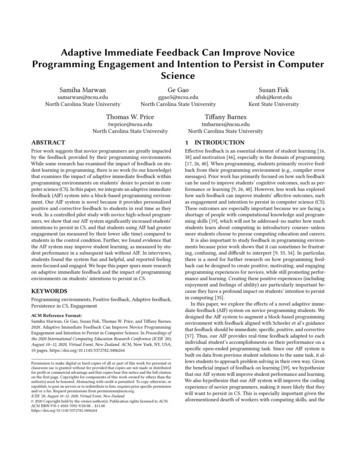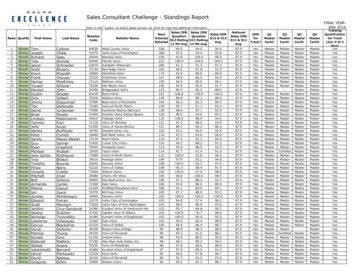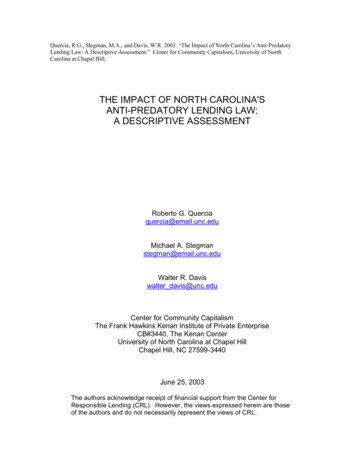
Transcription
North Carolina State UniversityCollege of DesignDepartment of Graphic Design Industrial DesignMASTER OF INDUSTRIAL DESIGNGraduate Student Handbook2020-2021This handbook is intended to provide supplemental guidance in planning industrial design graduatestudies. It includes information from the N C State Graduate School . Always reference the N C StateGraduate Handbook , as it includes comprehensive information that is updated regularly.If you have any questions, please contactKelly Umstead, Director of Graduate Programs (kaumstead@ncsu.edu) orTsai Lu Liu, Department Head (TsaiLu Liu@ncsu.edu)
CONTENTSPhilosophy and Objectives of Graduate Education at NC State4Organization of the College and Department4Administration and Faculty6THE MASTER OF INDUSTRIAL DESIGN CURRICULUM8Philosophy and Objectives of Graduate Education in Industrial Design at NCSU8Graduate Student Learning Outcomes8Admission of Applicants9The Curriculum of the Master’s of Industrial Design Program has the Following Objectives9The Industrial Design Graduate Studio Experience9POLICIES AND PROCEDURES11Pre-Registration11Inter-institutional Registration11Continuous Enrollment / Normal Progress11Student performance12Grade appeals and grievances12Approvals for Reduced Schedules / Leaves of Absence12Transfer Credits12DEGREE AND THE “TRACK” SYSTEM12Track TWO13Track THREE15Review and Advancement (Past First Year) of Track THREE Students16Early Advancement and Waiver of Design Studios16Student Performance16Termination of Student’s Graduate Program17GUIDELINES FOR GRADUATE ADVISORY COMMITTEES18Master’s Advisory Committees18Master’s Advisory Committees, Additional Members19Master’s Advisory Committees, External Members19Master’s Advisory Committees, Technical Consultant19How to Select your Graduate Advisory Committee19The Final Reviews21Submission of a Plan of Graduate Work21Deadline for the Submission of the Plan of Work22Degree Sought22Signatures22Recommendations for Minor Areas of Graduate Study23Frequently Chosen Electives (non-design)23Frequently Chosen Design Electives24
Note regarding MBA electivesGUIDELINES FOR THE MASTER’S DEGREE FINAL PROJECT2425Step One, Final Project Research: ID 58125Step Two, Final Project Studio: ID 58825The Public Review26Final Project Documentation Format for Master’s Students26RESIDENCY27Loans27Temporary Labor28GUIDELINES FOR GRADUATE TEACHING ASSISTANTS AND GRADUATE RESEARCHASSISTANTS29Recruitment and Selection29Orientation, Training and Supervision29Evaluation and Reappointment29Termination of Assistantship30Rights and Responsibilities30Scholarship/Fellowship Income Reportable for IRS Tax Purposes30ADDITIONAL PROGRAMS AND OPPORTUNITIES31
Philosophy of Graduate Education at NC StateGraduate education is another stage in intellectual development. It is different from undergraduateeducation in that the student is encouraged to establish premises, to hypothesize and to defend boththe procedure and the conclusions of independent investigation. The burden of proof for theverifiability of knowledge rests with the student, not on the faculty member. Students work as partnerswith the faculty in the creation, expansion, conservation, and transmission of knowledge. Research andscholarly inquiry form the foundation. Emphasis is placed upon the student’s scholarly developmentthrough coursework, studios, seminars, research and independent investigation. Graduate educationshould not lose sight of the fundamental differences between undergraduate and graduate education:the former is outer-and other-directed, while the latter is basically inner-and self-directed. Since theacademic posture of the teacher and student is modified — indeed reversed — it is mandatory that theessence of graduate education be understood by all to achieve the desired objectives.Finally, a new element of graduate education is gaining an expanded role, namely, post-baccalaureatelifelong learning. Two factors play a dominant role in this phenomenon: the first is the vast increase inknowledge, especially in science and technology, and the demands of society that individuals beabreast of recent developments to serve it better. The second is modern communications technology.There are fields of study today that did not exist a scant ten or even five years ago, and thephenomenon is gaining momentum rather than losing it. Ten years from today our universities will beteaching topics that have not yet been discovered. Add to this the fact that truly independent study ismore feasible today than it has ever been in human history, thanks to advanced communicationsystems. All this reinforces the need, especially in graduate education, to teach the student “to learnhow to learn.” In the future graduate education is, in a real sense, a phase that extends “for the rest ofone’s life” beyond the baccalaureate degree. The implications of this reality on graduate education areprofound and diverse, changing our concepts of campus life, teacher-student relationships, and thevery meaning of “going to graduate school.”Organization of the College and DepartmentThe College of Design is one of twelve major academic divisions that comprise North Carolina StateUniversity. It is a comprehensive design institution offering professional undergraduate and graduatedesign degrees in Architecture, Landscape Architecture, Graphic Design, Industrial Design and Art Design. The College of Design also offers a Phd. in Design, with concentrations in Community andEnvironmental Design, and in Information Design. The College of Design is headed administratively bya Dean, who is supported by an Executive Committee composed of the heads of each academic andadministrative unit in the College. A core administrative and technical staff is responsible to the Dean’soffice as well. A Department Head administers the Department of Graphic Design and IndustrialDesign. The College Graduate Scheduling Officer coordinates all graduate admissions and isresponsible for student records and all official communications between graduate students and theGraduate School.In addition, the Department’s Director of Graduate Programs for Industrial Design is responsible foradvancement reviews and advising within the department’s graduate program. Final decisions on allsuch matters remain the responsibility of the Department Head in consultation with the Director ofGraduate Programs and faculty.Industrial Design Faculty and Administrative TeamThe industrial design faculty is distinguished with numerous teaching, research, and professionaldesign awards. They have contributed juried articles to professional journals, presented papers atnational and international conferences, served on editorial boards, on the boards of national andinternational professional organizations, served on national and international design award juries,headed national and international design education committees, and have served as designconsultants to foreign countries design and educational programs.
Department HeadTsai Lu Liu (Lu), ProfessorTsailu Liu@ncsu.eduDepartmental Administrative Office, Brooks 215FacultyTim Buie , Associate Professortim buie@ncsu.eduRussell Flinchum, PhD , Associate Professorraflinch@ncsu.eduCarolina Gill , Associate Professorcgill2@ncsu.eduWarren Ginn , Assistant Professor of the Practicegwginn@ncsu.eduPercy Hooper , Associate Professorpercy hooper@ncsu.eduBong-Il Jin , Associate Professorbongil jin@ncsu.eduSharon Joines, PhD , Professor, Associate Dean of the College of Designsharon joines@ncsu.eduBryan Laffitte , A ssociate Professorbryan laffitte@ncsu.eduKelly Umstead , Assistant Professor, Director of the Graduate Programkaumstead@ncsu.eduAdministrative TeamSharon Joines, PhD, A ssociate Dean of the College of DesignTameka Whitaker, Assistant Dean of Student and Academic ServicesStudent Services Office, Main Floor, Brooks Hall
Jessica Jackson, Graduate Student Services Coordinatorjmjack22@ncsu.edu 919 515-8317Student Services Office, Main Floor, Brooks HallPamela Christie-Tabron , Registrar / College Facilities Reservationspamela christie@ncsu.edu 919 515-8308Student Services Office, Main Floor, Brooks HallKatherine Klinger , University Program Associate for Art Design, Graphic and Industrial Designaedge@ncsu.edu 919 515-8340Departmental Administrative Office, Brooks 215Kathleen Monroe Fenner , D irector of Career and Academic Advisingkamonroe@ncsu.edu (919) 515-8325Student Services Office, Main Floor, Brooks Hall
THE MASTER OF INDUSTRIAL DESIGN CURRICULUMObjectives of Graduate Education in Industrial Design at NCSUThe Master of Industrial Design degree is intended as preparation for students assuming roles in theprofession of industrial design. Currently within the profession and in industrial design education, thisdegree is considered the terminal industrial design degree. The program teaches from a generalistviewpoint and deals with all aspects of machine-made products and their relationship to people andthe environment.The Department of Graphic Design and Industrial Design at NC State University has a unique traditionof offering graduate design education to students whose undergraduate degrees and employmentexperiences may be either within or outside of the field of industrial design. This strategy allows us toadmit two complementary profiles of students. One is a student experienced in design who is enteringgraduate school for the purpose of developing a specialized area of expertise or as a means ofundertaking a career in design education. The other is a student with evident design ability, who isselecting design as a career choice after previous study and experience in another field. Together thesetwo admission profiles result in a rich and diverse graduate program environment conducive to theexchange of accumulated knowledge and experiences. This approach has allowed us over the past 25years to educate a number of graduates who have gone on to distinguish themselves as industrialdesign practitioners and educators. Our small program has the benefit of close connections betweenthe students and the faculty and provides an environment where the students learn from each other aswell as from the resources of the department, college, and university.Graduate Student Learning OutcomesIn order to combine critical elements associated with advanced, highly skilled, analytical-based studiowork in design, industrial design graduate students will engage in, lead, critique, and documentindividual inter/intra-disciplinary team investigations and project solutions. Through these endeavors:1. Students are expected to utilize research methods from professional design practice and otherrelated fields in their design process; to make judgments about the appropriateness of specificresearch methods and strategies for the specific nature of a design task; and to refine ordevelop research design methods as necessary.2. Students are expected to utilize research and design methods and tools that are appropriate tosupport collaborative work, engaging human-subject research, and addressing complexproblems.3. While addressing the potential for economic, social, cultural, and technological impacts of theirdesigns, students are expected to conceive and produce studio work that includes speculativeand propositional as well as concrete, functional solutions which are three-dimensionallyprototyped.4. Students are expected to demonstrate verbal, oral and visual communication skills throughouttheir design development process including interpersonal, formal and informal presentationsand critiques.5. Students are expected to demonstrate an advanced professional competence in a specificdesign specialization or depth of knowledge through a significant body of design workassociated with studios and their final project.6. Students are expected to use analytical tools, design processes, technologies, and informationgathered from primary and secondary sources to develop concepts, reveal patterns ofinformation, create rationales for specific design solutions or within projects, and to engage inboth solution development and evaluation.Evidence for each learning outcome will be collected from the MID students’ studio project reviews andfinal project proposals, reports and presentations.
The Curriculum Objectives of the Master’s of Industrial Design ProgramTo provide a sequence of initial preparatory courses that preparesstudents without prior design education for graduate level coursework indesign.To provide graduate studio and seminar courses that cause the student toinvestigate, reflect upon, and defend their conclusions on subjects relevantto their field.To provide our students with the experience of working on across-disciplinary design teamTo provide students with a traditional spectrum of graduate studiocoursework that assures all Master’s program graduates achieveprofessional practice preparedness.We encourage intellectual independence in the use of the resources of the college and university fordisciplined investigation into issues of social, technological and/or cultural importance and interest.This investigation forms the basis of the graduate student’s contribution to the body of knowledge ofthe field through their development of a final project.These objectives reflect an important aspect of design practice and have been carried out in theprogram in a range of venues. Cross-functional team endeavors have included projects with studentsand faculty from NC State Mechanical Engineering and Business Management, projects with studentsfrom NC State Aerospace Engineering combined with research scientists at the Jet PropulsionLaboratory in Pasadena, and collaborations with the manufacturing engineering division of IBM inResearch Triangle Park.The Industrial Design Graduate Studio ExperienceAt the Master’s level, the industrial design studio experience centers both on design methodology andintellectual inquiry. The studio courses require that students synthesize knowledge gained boththrough instruction and investigation, and apply that knowledge in the development of ideas and thetask of problem solving. The Master’s level student is expected to demonstrate a mastery of subjectmatter in their field, both in practical application and scholarly investigation.The industrial design graduate students also have opportunities to participate in industry collaborativestudio projects sponsored by corporate sponsors such as BD, Bosch Siemens Home Appliance,Eastman Chemical, Hanes, JLG, and Lenovo. Sponsored projects provide students with the experienceof designing in a real-world setting and interacting with professional designers, engineers, andbusiness executives.Students are expected to maintain regular attendance in the graduate studio. Your presence in thespace affords you the opportunity to interact with your peers and to immerse yourself in the graduateprogram. You are expected to maintain a professional workspace which is populated with current,process work yet clean. Faculty may schedule periodic visits, critiques, or presentations during thesetimes. Students holding teaching assistantships must work around this schedule in the execution oftheir duties and notify faculty of assignments that take them out of the studio space during regularhours.
Purchase of a computer is expected (recommended specifications are available on the informationtechnology webpage h ttp://design.ncsu.edu/resources/it-lab ).POLICIES AND PROCEDURESPre-RegistrationAll continuing graduate students are required to pre-register for each succeeding semester during theuniversity’s normal pre-registration period. The department does not guarantee seats in classes forwhich students are not pre-registered. Students who fail to pre-register and register late will beassessed a late fee and will be admitted to classes, including studio, on a space-available basis only.Students must make an advising appointment with the director of graduate programs to discusscourse selection and to secure the release of the hold on registration in the online system. Studentsmay check their registration status at any time through the MyPack Portal online.Inter-institutional RegistrationNC State participates in an Inter-institutional Registration program with the University of NorthCarolina at Chapel Hill, the University of North Carolina at Greensboro, and Duke University. Under thisagreement, NCSU graduate students are permitted to register for classes on these other campuses,upon recommendation of their advisory committees.Even though taking a course on another campus, the student is exclusively under the administrativedirection of the NCSU Graduate School. Enrollment for courses on other campuses will take place onthis campus, using special forms obtained from the Department of Registration and Records. Suchcourses are considered by The Graduate School to be a part of the student's normal load and thestudent will be billed for the courses through the NC State University Cashier’s Office. During thesummer, the procedure is somewhat different in that a student must be enrolled in at least one courseon the NCSU campus during the same session as the requested inter-institutional registration.When the grading system on the campus being visited is different from the NCSU System, gradesreceived under Inter-institutional Registration will be converted. “H,” “P,” “L”, and “F” grades earned atthe University of North Carolina at Chapel Hill and “E,” “G,” “S” and “F” grades earned at DukeUniversity will be converted to “A,” “B,” “C” and “F” grades, respectively.Continuous Enrollment / Normal ProgressAll graduate students are expected to be continuously enrolled and to make normal progress towardtheir degrees. Normal progress is defined as enrollment in 9 or more credit hours, with 12 credit hoursrepresenting a typical schedule. 15 credit hours is anticipated for first year Track III students and is themaximum per semester. All graduate students are expected to be enrolled continuously in designstudios, unless their approved Plan of Work specifies an arranged interval.Student PerformanceStudents should review policies related to academic standing in the web version of the universitygraduate handbook.Grade Appeals and GrievancesThe Master of Industrial Design Program adheres to policies in the College of Design regarding gradeappeals and grievances. A copy of the policies may be obtained from the Associate Dean orDepartment Head. Students must follow College of Design procedures before taking complaints orgrievances to the Graduate School. Students should address concerns first with the faculty of recordbefore addressing the Department Head. Failure to follow prescribed procedures may jeopardize anyappeal. The Graduate School will not become involved until all avenues of resolution have been
exhausted at the department and college levels. Neither will the Dean in the College of Design enterinto discussions on any grievance or appeals that have not first been addressed through theappropriate process.Approvals for Reduced Schedules / Leaves of AbsenceYou must take at least 9 credit hours each semester; a schedule of 6 credit hours is allowed only withthe Department Head’s permission. An exception is allowed in your last (Final Project) semester, whenyou may have only the ID 588 Final Project Studio for 6 hours.If you are a TA or an RA, you must have a full-time student status. If you are in your last semester andonly need ID 588 (6 credit hours) in order to complete your degree, you must complete an academiccourse load waiver request (which can be found in MyPack Portal). Once you have completed thewaiver, email the DGP and the graduate student administrator to confirm that you will be consideredfull-time even with the reduced course load so that you do not lose your GSSP.If you are an international student, you must be a full-time student (for a student visa). If you are inyour last semester and only need ID 588 (6 credit hours) in order to complete your degree, you mustcontact OIS for authorization to have a R educed Course Load (RCL). You must be authorized by OISfor the RCL BEFORE dropping below full-time.Note: Students who wish to take a temporary leave of absence or to reduce their schedule below 9credit hours in a given semester must request and receive approval from their Graduate AdvisoryCommittee and the Department Head.Transfer CreditsRequests for transfer of credits during study abroad and similar experiences should be submitted tothe DGP including the course title, level (including the identification of graduate level courses at thatinstitution), course description and syllabus, grade, evidence of work completed and degreerequirement sought to be fulfilled in the GPOW. No more than 9 transfer credits are allowed. Allcredits must be relevant to the MID degree, be from an accredited institution and not counted towardthe completion of another degree. See the Graduate Student Handbook for additional informationregarding number of credits that may be transferred at the graduate level.
M.I.D. DEGREE AND THE “TRACK” SYSTEMThe Master of Industrial Design is the terminal university degree offered by the Department ofIndustrial Design. In order to accommodate the wide variety of academic and professionalbackgrounds of our graduate candidates, the College of Design has developed two different “Tracks”of graduate study. They are defined as follows: Track TWO , and Track THREE .Track TWOThis is a 48-credit hour program for a candidate with a four-year undergraduate degree in industrialdesign or a related design field. Incoming Track TWO students will be assumed to have a basicknowledge of Materials & Process which will be assessed at the beginning of the semester. TheMaterials & Process I (ID 511) requirement will be waived for students passing a basic materialknowledge placement exam. Incoming Track TWO students will be registered for courses assuming apassing grade on the exam.Specific course work will vary due to unique Special Topics and Elective offerings; however, therequired curricular path for a Track TWO student should be as follows:YearOneSemesterCoursesFallID 500 Human Centered Design StudioID 512 Materials & Processes II †ID 582 Research Methods in DesignElective*ID 500 Design Research StudioDesign Elective**Design Elective**Elective*ID 500 Product Innovation Lab StudioID 581 ID Final Project PreparationID 588 Final Project StudioID 582 Special TopicsSpringTwoFallSpringCredits633363336363Total RequiredHours:Included inPOW?Yes15Yes159948YesYes† Students p assing a basic material knowledge placement exam will have the Materials & Process I (ID 511)requirement waived. Students having taken ID 255 at NCSU must have received at least a ‘B’ in order to beeligible to have the Materials & Process I requirement waived.*Electives should be courses listed at the 500 and above. A student may take up to 6 hours of 400-level courses forgraduate credit provided that they are outside the student’s major and the program is not at the doctoral level.**Design electives should be courses listed at the 500 and above.Note: Student having the Materials & Process I (ID 511) requirement waived does not reduce the number of hoursrequired to complete the degree (this is not credit by examination). Instead the student’s curricular path and planof graduate work will reflect an additional elective for focused study.Total Degree Hours Required: 48
The required curricular path for a Track TWO student n ot passing the basic material knowledgeplacement exam should be as follows:YearOneSemesterCoursesFallID 500 Human Centered DesignStudioID 582 Research Methods in DesignDesign Elective (Typ: ID 582Fabrication & Prototyping)ID 500 Design Research StudioID 511 Materials & Processes IDesign Elective**Elective*ID 500 Product Innovation LabStudioID 512 Materials & Processes IIID 581 ID Final Project PreparationID 588 Final Project StudioID 582 Special Topic l RequiredHours:Included inPOW?Yes12Yes15Yes12948Yes*Electives should be courses listed at the 500 and above. A student may take up to 6 hours of 400-level courses forgraduate credit provided that they are outside the student’s major and the program is not at the doctoral level.**Design Electives should be courses listed at the 500 and above.Total Degree Hours Required: 48
Track THREEThis track is a program for a candidate with an undergraduate degree in a non-industrial design area. Ifyou are a Track THREE student there are two sets of requirements you must observe while pursuingyour studies:1.2.A graduate faculty review (see Review and Advancement section following) before movinginto second year graduate level coursework.Following Year One, a minimum of 48 hours of graduate level courses.Specific course work will vary due to unique Special Topics and Elective offerings; however, therequired curricular path for a Track THREE student should be as follows:YearSemesterCoursesOneFallID 582 Graduate Studio IID 582 Product Digital Techniques IID 582 Product Visualization IElective*(ID 582 Fabrication & Prototyping)ID 582 Graduate Studio IIID 582 Product Digital Techniques IIID 582 Product Visualization IIID 511 Materials & Processes IID 500 Human Centered Design StudioID 512 Materials & Processes IIID 582 Research Methods in DesignElective**ID 500 Design Research StudioDesign Elective ***Design Elective ***Elective **ID 500 Product Innovation Lab StudioID 581 ID Final Project PreparationID 588 Final Project StudioID 582 Special Topic 3336333633363336363Total RequiredHours:Includedin POW?No15No15Yes15Yes159978YesYes*Elective may be courses listed at the 400 and below (ID 582 Fabrication and Prototyping recommended)**Electives should be courses listed at the 500 and above . A student may take up to 6 hours of 400-level courses forgraduate credit provided that they are outside the student’s major and the program is not at the doctoral level.*** Design electives may be selected from any course offered by the College of Design listed at the 500 and above.Minimum Year One Hours Required: 30Minimum Years Two and Three Graduate Hours Required: 48Total Degree Hours Required: 78Note that Year Two and Three of Track THREE parallel those courses outlined in Year One and Two ofthe Track TWO schedule. Ultimately, as a Track TWO or Track THREE student, you must have aminimum of 48 hours of graduate credit to graduate with the MID degree.Review and Advancement (Past Year One) of Track THREE Students1.2.Students completing coursework with a B average or better may be advanced without review.Students completing coursework with less than a B shall be reviewed to determine ifadvancement is advisable.
3.Evaluations of each student’s studio performance shall be made each semester by the studioinstructor. The Department Head, who may require a conference with those studentsexperiencing difficulty, shall review these evaluations each semester.Early Advancement and Waiver of Design Studios1.2.3.4.It should be recognized that this is an exceptional procedure and requires clear and compellingjustification. Substantial professional experience or education in design will normally be aprerequisite for such consideration.Advancement requests should be prepared in writing by the student and presented to theDepartment Head at the end of their first or second studio.The Department Head will review the student’s file, studio evaluations, and consult with thestudent’s Committee and instructors. If the request seems reasonably supported, a formaladvancement review will be conducted.The review shall consist of an interview and examination of studio work. The Graduate FacultyCommittee will conduct the review. A majority vote of the group, with the Department Headconcurring, shall decide for/against the student’s request.Student PerformanceGraduate students are expected to maintain a 3.0 grade point average. The Graduate School hasestablished the following policies regarding academic standing:“Graduate students are given a notice of academic warning if they have accumulated less than ninehours at the 400-level or above and have less than a 3.0 (“B” average). Graduate students are p lacedon academic probation if they accumulate nine or more, but less than eighteen credit hours at the 400level or above and have a grade point average of less than 3.0 (“B” average). A student’s graduatestudy will be terminated if eighteen or more credit hours at the 400 level or above have beenattempted with a grade point average of less than 3.0 (“B” average). In cases of program termination,no further registration in a graduate classification will be permitted. Under extenuating circumstances,the student will be reinstated upon the written recommendation of the Department Head and approvalof the Graduate Dean. Departments have the prerogative of recommending the termination of astudent’s graduate admission at any time.”Termination of Student’s Graduate ProgramTermination of a student’s Graduate Program is an extremely serious action and is taken only as a finalstep, when other measures are no longer appropriate. Students must realize that much of theresponsibility for their program, its educational value and the procedures which shape it, are in theircontrol. Each graduate student should make every effort to understand the rules established by TheGraduate School and the policies of the Department, which pertain to Graduate Studies.Failure to adhere to the following policies and deadlines may result in termination of a student’sGraduate Program or in an enforced one-semester interruption of Graduate Studies:1.2.3.4.5.Failure to enroll continuously without prior Department Head approval.Failure to undertake a minimum of 9 credit hours each semester without prior DepartmentHead
Tsailu_Liu@ncsu.edu Departmental Administrative Office, Brooks 215 Faculty Tim Buie , Associate Professor tim_buie@ncsu.edu Russell Flinchum, PhD , Associate Professor raflinch@ncsu.edu Carolina Gill , Associate Professor cgill2@ncsu.edu Warren Ginn , Assistant Professor of the Practice gwginn@ncsu.edu











